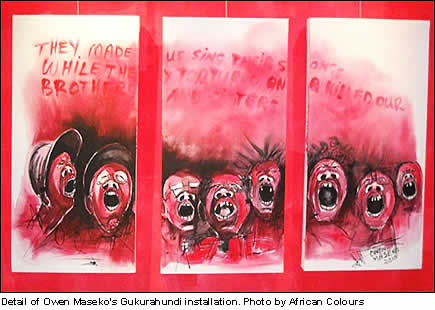‘Progress’ in Zimbabwe highlights
Thursday, November 18th, 2010 by Amanda AtwoodI recently had the privilege of being at the ‘Progress’ in Zimbabwe conference organised by the Mass Public Opinion Institute, Bulawayo Agenda and the University of Johannesburg.
Various national, regional and international speakers participated, including: Amanda Hammar, Bill Freund, Blair Rutherford, Blessing Karumbidza, Brian Raftopoulos, Charity Manyeruke, Claude Kabemba, Easther Chigumira, Erin McCandless, Godfrey Kanyenze, Ian Phimister, Ibbo Mandaza, John Hoffman, John Makumbe, John Saul, Jocelyn Alexander, Josephine Nhongo-Simbanegavi, Joy Chadya, Kirk Helliker, Kumbirai Kundenga, Lionel Cliffe, Luise White, Mike Davies, Richard Saunders, Rob Davies, Roger Southall and Showers Mawowa.
Some of the stand out comments for me included:
- John Makumbe on The Parties & Their Politics: In Southern Africa, no liberation movement has ever handed power over to another political party. It is therefore obvious that liberation movements are necessarily dictatorial. So it is naïve to expect to remove them from power through democratic means. Any dictator who is susceptible to removal from power through democratic means is not a dictator. More
- Brian Raftopoulos on Labour’s Past, Present and Future: Raftopoulos discussed the ways trade unionists have tried to use an industrial relations discourse in order to avoid political intervention. Trade unions in Zimbabwe, as elsewhere, are very much children of the Enlightenment – they are very much those who have pushed for universal rights, and have often fought national repression through a recourse to a call for universal rights. This was interpreted by some as labour becoming ensconced in a kind of cosmopolitan Western discourse. Raftopolous found this wrong on two scores. Firstly, it misses the long historical precedent of this kind of discursive framework within labour – it’s not a new thing. Secondly, it assumes that because there is some agreement between international positions and the position of the labour movement in Zimbabwe, that the latter is complicit with imperialism. This is to assume that that whole project can be defined by how it is understood from outside, without looking at the local dynamics which are generating and producing those particular discourses. More
- Ibbo Mandaza on ‘Intellectuals’ and Progress in Zimbabwe: Radical scholars were systematically exorcised from positions of influence over the state. Mugabe’s Zanu PF is right wing, despite its anti imperialist rhetoric. The international community is less concerned about democracy and human rights than they are about stability. Thus, if it is accepted that there is a level of stability now as compared with 2008, this is accepted as “progress.” More
- Easther Chigumira on Landed Economies – Farming & Farmers Then & Now: Responding to Blessing Karumbidza’s presentation, Easther Chigumira questioned his convictions that farming “then” (as in the 1980s) is really so different from farming “now.” She noted there is still multiple farm ownership, still patronage, still bifurcation, but it is by class, not race. Key institutional structures, such as markets, are weaker than they were in the 1980s. Thus, she said, she was not as optimistic about new farmers, particularly given the long term degradation of the environment which has happened in the process. There is gold panning, sand mining, organised by suitcase farmers. Is that really progress? More
- Kirk Helliker on Civil Society – Strategies for Emancipation: Helliker argued that much of the conflict in contemporary Zimbabwean society is a discourse around state politics. The struggle is a struggle for state power. This, he said, marginalises more democratic radical popular movements – like the land movement – captured by state and delegitimisesd by liberals. He agreed that just because trade unions develop a position towards the state, and international capital develops the same position, this doesn’t necessarily that there is some sort of alliance, or that the trade unions are in the in pocket of international capital. However, he cautioned, there is a similar risk of reductionist thinking if you argue that the land movement was just an election ploy. This reduces the agency of rural people and war veterans to being simply pawns of Zanu PF. More
- Luise White on Zimbabwe Compared – ‘Progress’ in the Rest of Africa: White warned that governments of national unity simply reinvent the one party state with more international clout than the one party state has had since the 1960’s. She said this is retrogressive. There is now a single party apparatus that has access to international funding and donor participation. More
For a full listing of write ups and audio files from the different sessions, view the ‘Progress’ in Zimbabwe conference index page












